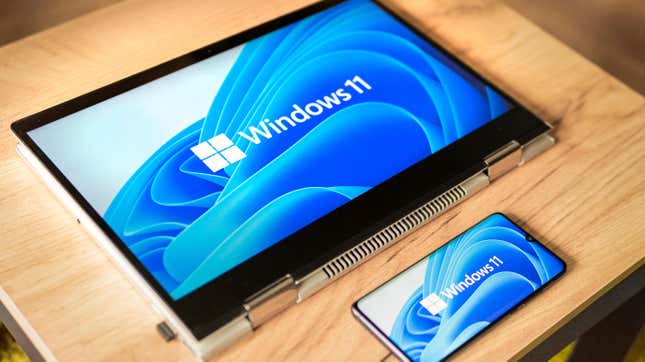
Microsoft’s head is already in the clouds for artificial intelligence, but in order to sell even more people on its AI services the company is reportedly working toward allowing the entire Windows 11 operating system to be streamed from the cloud for its user-end consumers.
According to presentation documents revealed from the current hearings between the Federal Trade Commission and Microsoft over its planned acquisition of Activision Blizzard, the tech giant has a long-term goal of letting users load the entirety of Windows 11 through the cloud. The documents, first reported by The Verge, date back to June 2022. The stated intent to move Windows 11 “increasingly to the cloud” would build on its current efforts to enable ever-access to the company’s Windows 365 software suite. Microsoft said it would “Use the power of the cloud and client to enable improved AI-powered services and full roaming of people’s digital experience.”
The 365 suite already streams a version of Windows directly to users’ devices from Microsoft servers. It’s mostly meant for businesses looking to run the company’s enterprise software on non-PC or other mobile devices that normally can’t. Then in May, Microsoft introduced the Windows 365 Boot in public preview that lets users sign in directly to the cloud version of Windows 365, essentially turning any device into a Windows PC.
Gizmodo reached out to Microsoft for comment, but we did not immediately hear back.
While the business end of Windows streaming isn’t that exciting, the idea of Microsoft’s consumer end going to the cloud would be a big step for the most popular desktop OS in the world. More than likely, it would incentivize even more artificial intelligence in the company’s user-end portfolio. Generative AI is already a growing aspect of 365, with the company’s so-called ‘copilot’ married to apps like Word, Excel, and PowerPoint. The copilot is now baked into the Windows 11 taskbar, and Microsoft is allowing even more AI apps through its Microsoft Store.
Otherwise, the company reportedly mentioned elsewhere in its presentation last year that it needs to “respond to Chromebook threat” with more cloud-based PCs. It’s good to remember this was months ago when beefy Chromebooks had an inkling they could replace honest-to-God PC hardware. ChromeOS has added new features and worked to revitalize old, decrepit hardware that can no longer run the latest version of Windows or macOS.
Windows 11 did gain some noteworthy features like live captions last year. Still, it’s nowhere near as slimmed down an operating system as Google’s OS is, meaning it’s that much more annoying to reliably support it on various platforms. If Microsoft truly wants a user-centric version of Windows for streaming, that’s probably where it could start rather than adding watermarks to unsupported PCs.
Microsoft has been trying to grow 365 and other cloud-based services like Xbox Game Pass. The company’s game streaming service is a major sticking point for the FTC and other regulators worldwide. Antitrust advocates have complained the Activision deal would greatly reduce competition in the gaming market. The ongoing hearings in California federal court could greenlight the FTC’s injunction against the merger.